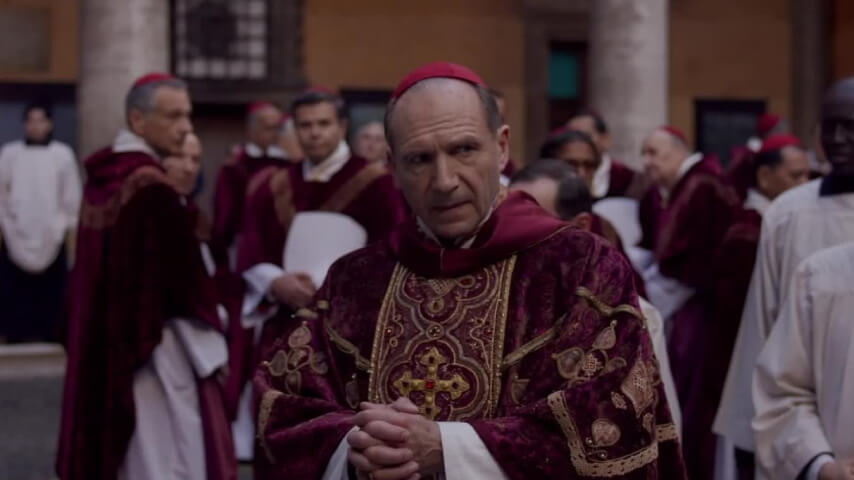A career-best Ralph Fiennes leads a gripping search for the next pope in Conclave
Edward Berger follows All Quiet On The Western Front with a thriller free from cinematic sin.
Photo: Focus Features
Faith and religion tend to be internalized in such intangible and romantic terms that it is easy to overlook the inherent clash between the two. Where the former is a solitary and primal response to the mysteries of existence, the latter is an institutionalized, often political setup with rules and traditions devised for the masses. And where there is politics, there are often secrets, an inevitable hunger for power, and less-than-ethical means to attain it.
A searing and impeccably designed Vatican procedural with today’s global political climate (and even the upcoming American elections) so obviously on its mind, Edward Berger’s lean and mean Conclave is juicily perched at the intersection of this conflict between faith and organized religion. A gradually swelling, deeply intellectual, and unexpectedly fun political thriller, Berger’s twisty film takes the audience behind the notoriously secretive closed doors of the Catholic Church for one of its most private processes: the election of a new pontiff.
Adapted from Robert Harris’ novel by Peter Straughan (Tinker Tailor Soldier Spy), Conclave begins on the day of the sitting pope’s unexpected passing. Before the title even appears, Berger and his DP Stéphane Fontaine lens the mournful proceedings with relentless precision—a blend of immersive long takes and nervy cuts—until the pope is finally in a body bag, reinforcing the defining quality of the movie that we’re about to see: an artful, well-choreographed, inch-by-inch exactness that also anchored Berger’s brilliant Oscar winner, All Quiet On The Western Front. Don’t be fooled by how tedious the premise of finding a new pope might sound on paper. In Berger’s studious and elegant hands, every ceremoniously cast vote, every reaction shot, every severely worn regalia and every quietly eventful meal that the cardinals share is packed with breathless, skin-prickling suspense. That temperament is escalated by Oscar-winning composer Volker Bertelmann’s gorgeous and formidable strings, that slyly switch between staccato beats and restless seesaw-y cadences. And there is plenty of humor amid the bureaucratic machinations, too—just picture a sternly garbed cardinal operating a loud, posh espresso maker in the holiest and most old-fashioned of settings.
The election process, which goes multiple rounds over the course of several days, begins before we can even deliberate whether there is foul play in the pope’s untimely death (him being a man with various liberal viewpoints unpopular with some). Overseeing the ritualistic conclave where all cardinals below a certain age are allowed to vote is Cardinal Lawrence (a Ralph Fiennes of silent inner battles, delivering one of his career-best performances), the dean of the College of Cardinals. Lawrence’s faith has been in a bit of a crisis lately. Aware of that aforesaid conflict between his faith and the institution that he serves—the Catholic Church has a notoriously ill reputation on various accounts, from cases of sexual abuse to links to Nazism (Pope Benedict XVI was a former member of the Hitler Youth)—Lawrence reveals that he had actually resigned to the late pope, only for his resignation to be declined. Now, he just wants to complete his final duty and face his uncertain future.








![HBO teases new Euphoria, Larry David, and much more in 2026 sizzle reel [Updated]](https://img.pastemagazine.com/wp-content/avuploads/2025/12/12100344/MixCollage-12-Dec-2025-09-56-AM-9137.jpg)































